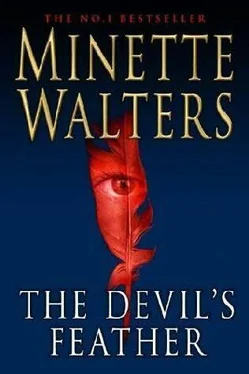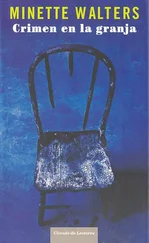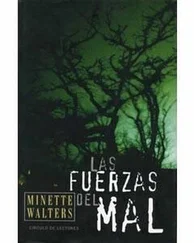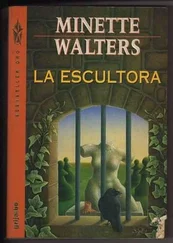Ahead of me, fifty metres across the grass, was the fishpond where Jess had found Lily. I stared at it for several minutes as something to focus on and, because Lily was less alarming to think about than MacKenzie, I began wondering about her again. What had taken her there on a cold winter’s night? Peter had said there was no logic to Alzheimer’s wandering-she may have been acting out a memory or following an imperative to feed the long-dead fish-and had slipped and fallen. It could have happened anywhere.
For once, Jess agreed with him. “If Madeleine had been around, I wouldn’t have put it past her to give Lily a push-solve all her problems in one fell swoop-but she wasn’t.” She shrugged. “There used to be fish in the pond but I don’t remember Lily ever feeding them. Maybe she just wanted to see if they were still there.”
Because I was sitting in the woodshed, it occurred to me that Lily might have come out to collect logs for the fire. Whatever Peter said about logic, it was the obvious thing to do on a cold night, and the pond would have proved an easy distraction because it was so close. I still didn’t understand why she hadn’t moved herself into the kitchen. The Aga threw out more warmth than any of the fires and required no effort to keep it burning as long as there was oil in the tank. Why hadn’t an instinct for survival triumphed over snobbery and dementia?
I even wondered if some forgotten memory had prompted her to look for water in the well beneath me. It was dismantled and long-redundant, covered over by the wooden planks that the logs sat on, and I only knew it was there because Jess had told me. She said it was her grandmother’s job to draw the water and heat it for the family’s baths before the house was put on a mains supply. Could Lily’s dementia have taken her back fifty years and sent her outside to look for bathwater?
Fate has a strange way of propelling us forward. I was very close at that moment to unravelling Lily’s riddle, even closer when thoughts of hot baths reminded me that I hadn’t checked the oil since I arrived. It seemed a good time to do it, as the door was just behind me. Perhaps, too, I was curious to see if Jess had returned the scullery keys to the hook behind the tank. Propping the axe against the door jamb, I unlatched the door and pulled it open.
The sun was touching the distant horizon but there was still enough light to show the tank inside the outhouse, though not enough to read the gauge. I felt around for a switch, and in the process dislodged a sheaf of flimsy papers that were fixed to a wooden upright by a drawing-pin. They fluttered apart as they fell, but when I finally located a switch and was able to gather them up again, I saw they were receipts of some sort from the oil supplier. I couldn’t believe they were important since one was dated 1995, but as the drawing-pin had vanished, I tucked them into my pocket to take back into the house.
Having satisfied myself that the gauge was registering over half full and there were no keys on the hook behind the tank, I killed the bulb again. But either my eyes had trouble readjusting or night had fallen during the few minutes I was inside. I realized suddenly how little I could actually see. With no artificial light anywhere, not even in the house because the sun had still been shining when I left it, the garden was a place of stygian shadow.
With shaking hands I recovered the axe and turned towards the path. As I did so the overhead lamp came on in the kitchen, and I saw Jess walk past the window. My immediate feeling was relief, until I saw the gleam of her dogs’ pale coats in the backwash of light and realized they were between me and the house. With nowhere else to go, I stepped back and felt for the outhouse latch again.
Mastiffs can move with extraordinary speed. They covered the ground long before I had the door open. I doubt I’d have been able to use the axe if they’d attacked me-I wouldn’t have had time-but I raised it to shoulder height in preparation. Faced with a visible threat, my brain persuaded me to show some courage for the first time in weeks.
“Get down !” I growled. “NOW! Or I’ll beat your fucking brains out.”
Perhaps eyes are the key. Perhaps they saw real intent in mine because, amazingly, they dropped to their bellies in front of me. Jess claimed afterwards that it’s what she’d trained them to do, but their obedience was so immediate that I lowered the axe. I’d have accepted an indefinite stand-off if one of them hadn’t started inching towards me.
I thought briefly about calling for Jess, but I didn’t want to alarm the dogs with loud noises, and chose instead to put myself on their level by sitting down. I can only explain it by instinct, because logic was telling me I’d have more authority standing up. I remember thinking I’d appear less afraid if I could hold a rock-steady position on the ground with my back against the outhouse door.
Which is how Jess found me, ten minutes later, shivering, cross-legged with three great muzzles in my lap, and two of the male dogs using my shoulders as leaning posts. I don’t recall what I said to them, but it was a long and rather aimless conversation, punctuated by a lot of stroking. In the time I sat there, I became an expert on mastiffs. They have a drooling and flatulence problem, they snort and wheeze, and the boys roll over at the drop of a hat to expose their extremely large testicles.
I watched Jess approach with a torch. “Are you OK?” she asked.
“MacKenzie knows about dogs,” I told her. “If I can do this, he’ll have them eating out of his hand in a minute flat.”
“They’ve got you penned in, haven’t they? Try standing up.”
“They’re too heavy.”
“Point made then.” She clicked her fingers and motioned them to stand behind her. “They’d have barked if you’d tried to move, and I’d have found you a lot quicker. What are you doing out here?”
I nodded to the axe which was lying on the ground where I’d left it. “Looking for weapons.”
She stooped to pick it up. “I’d forgotten Lily had that. I’ve brought you a few things from the farm. There’s a couple of baseball bats that belonged to my brother and a lead-weighted walking-stick. I’d lend you a gun but you’d probably shoot yourself by mistake.” She eyed my rigid posture. “Are you coming back in?”
“What about the dogs?”
Jess shrugged. “It’s up to you. We can leave them out here or take them inside. But I’ll tell you this for free, if you’d had Bertie in the house earlier, I’d never have been able to reach your bedroom without him hearing me.”
“I meant, will they do something if I move?”
“You won’t know unless you try.”
“Can’t you shut them in the hall?”
“No.” She turned away but not before her teeth flashed in a smile. “If you can sit with their heads in your lap, you won’t have a problem walking past them.”
THE MOST DRAMATIC THERAPY for phobias is “flooding,” where a person is immersed in the fear reflex until the fear starts to fade. It’s a form of familiarization. The longer you’re exposed to what you fear, the less anxious you feel. It doesn’t work for everyone, and it wouldn’t work for me if I was locked in a cellar again with some Alsatians, but I did relax with the mastiffs. It’s hard to be frightened of an animal that wags its tail every time you stroke its head. “Is this Bertie?”
Jess glanced sideways from where she was cooking a fry-up on the Aga. “No, that’s Brandy. There are two bitches-Brandy and Soda-and three boys-Whisky, Ginger and Bertie. I wanted Lily to call Bertie ‘Jack Daniels’ but she wouldn’t do it. He’s the one with his chin on your feet.”
“Do they fight?”
Читать дальше












